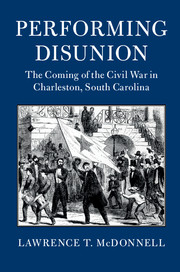9 - Carry Out the Great Drama
from CONTRADICTIONS: STAND NOBLY TOGETHER
Published online by Cambridge University Press: 08 June 2018
Summary
There was no going back, Congressman John Durant Ashmore told Ben Perry, explaining why upcountry moderates had abandoned opposition to disunion in the weeks following Lincoln's election. Privately, footdraggers spoke of the shift as suicide, yet Ashmore mixed fatalism with a bitterly triumphant streak of schadenfreude. “[T] he deed is done, the die is cast,” and the Union already sundered in spirit if not yet in fact. Like his powerful patron Larry Orr, Ashmore had been “driven” since the events at Harper's Ferry, “in spite of myself,” toward the party of crisis. “My very soul shrank with disgust & contempt from some [of those] men,” he allowed. Yet he grew grimly elated to see radical loudmouths “trembling in their shoes … to find that Orr & myself were ready for action.”
Extremists expected moderates “to crotch the wheels – to put on the breaks & then as heretofore to abuse us as submissionists.” Not this time. When serenaders confronted the congressman at a Columbia hotel, he “responded in a very definite, decided” appeal for disunion. “It did me good to see them tremble & quake,” Ashmore declared. Those who had “clamoured” so often for secessionist unity could have it now – and choke on it. The world would find out soon enough who was resolute and who would flinch.
After independence the tide turned back. Did separation mean that Washington would no longer deliver his mail, Ashmore asked timidly. It meant that – in spades – came the reply, and much more besides. But by then, as the reluctant revolutionary said, the damage could not be undone.
In its confused interplay of purpose – self- destructive vengefulness, self- deceiving fatalism, catastrophic brinkmanship – Ashmore's response to Lincoln's election epitomizes the careening course of moderates on the other side of the state. Enmeshed in the coils of the South Carolina jeremiad, alive to the warring dictates of honor and respectability's codes, accustomed to the melodramatic performance of political relations and social identity, ever seeking the main chance, men hurrahed for the secessionist cause, mostly hoped it would never come to that, and fell into line. As play and performance, subversion and commerce, disunion overwhelmed the men who made it.
- Type
- Chapter
- Information
- Performing DisunionThe Coming of the Civil War in Charleston, South Carolina, pp. 186 - 207Publisher: Cambridge University PressPrint publication year: 2018



